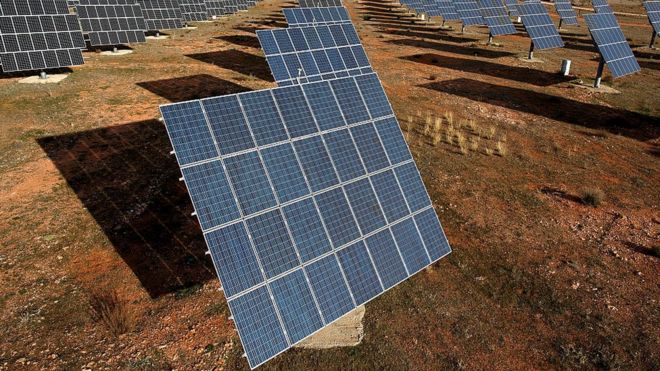Hackers could target electricity grids through
security flaws in solar panel equipment, a Dutch researcher has said.
Willem Westerhof found 17 vulnerabilities in inverters, which convert
electricity produced by the panels so it can be used on the grid.
He said internet-connected inverters could be targeted by hackers.
One manufacturer said that only "a small fraction" of its devices
were affected.
After discovering vulnerabilities in devices produced by a range of
manufacturers, Mr Westerhof carried out a field test near Amsterdam on two
inverters made by SMA.
He told the BBC the test showed it would be possible for an attacker to
remotely control the devices and alter the flow of power.
Because energy equipment on the grid needs to balance supply with demand,
overloading the system could result in a power cut.
'Serious
consequences'
"If an attacker does that on a
large scale, that has serious consequences for the power grid stability,"
said Mr Westerhof.
Energy researcher Iain Staffell, at
Imperial College London, told the BBC, "It's certainly a risk to
electricity supply and could stress grid operations."
However, he did not believe it could
cause blackouts and he pointed out that a large number of inverters would have
to be attacked at once for any significant effect to occur.
SMA responded by pointing out the
limitations to such an attack:
- only four of its models are affected by the
vulnerabilities
- users are advised to change default passwords when
installing the devices, though this is not required
- inverters not connected to the internet are safe
"The security of our devices
has highest priority for SMA in all respects," the company said in a
statement.
"We already assessed the
mentioned issues on a technical basis and [are working] intensively on the
correction."
It added that it would publish
further responses to Mr Westerhof's research in the coming days and that it was
working on a report about the security of its products with the Dutch National
Cyber Security Centre.
Asking users to change passwords was
a way of pushing liability away from the manufacturer, said cyber-security
researcher Tom van de Wiele, at F-Secure.
"The vulnerabilities are real,"
he said, though he agreed with SMA that not all inverters would be open to
attack.
"Just because you bought one of
their products and a solar array, [it does not mean] that you are
vulnerable."
He added that he had seen similar
security issues in other industrial products.
Mr Westerhof discovered the security
flaws while working on his undergraduate thesis and detailed the research in a
talk at the SHA2017 security conference in the Netherlands on Monday.
He said he had decided not to
release full details of potential attacks on the inverters, to avoid
encouraging malicious hackers.
"Solar producers should seek to
isolate the products from the internet ASAP," said Dave Palmer, director
of technology at cyber-security company Darktrace.
"And [they should] also review
their physical access security to reduce the risk of a local attack from
someone physically breaking into their facilities."


Comments
Post a Comment